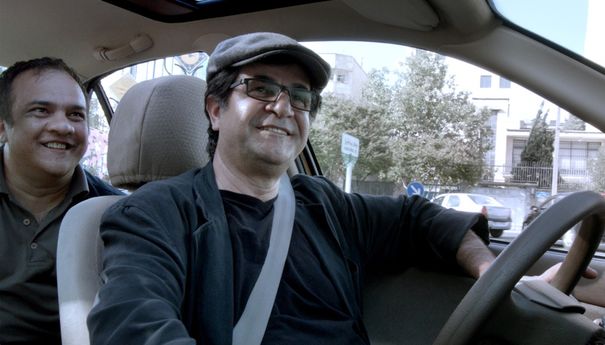Dashboard Dispatches from Iran
By Julia Cooper
If Sundance had TANGERINE, a fêted feature that caused a stir for having been filmed entirely on an iPhone 5S, then the Berlinale Competition has TAXI, a street film captured on Jafar Panahi’s dashboard camera.

The medium is the message as Panahi films the streets of Tehran in real time picking up a motley string of passengers along his way. These companions hold forth on an array of issues central to life in Iran, from Sharia law and capital punishment, to film piracy and a woman’s right to inherit her husband’s property. TAXI is funny and sweet—the camera is often looking up into the twinkling eyes of its filmmaker—with coy references to his earlier films throughout. I found myself so enthralled by the absurdity of the film’s comedic banter that I forgot, until the empty credits, that TAXI’s idle chitchat is also the stuff of life and death.
Shedding the claustrophobic constraints of his last two features THIS IS NOT A FILM and CLOSED CURTAIN (both filmed under house arrest, the former smuggled out of the country on a USB stick) Panahi’s TAXI is a fluid film that is rarely still. Rather, the artist is back in the world having taken his camera to the streets. Days after TAXI’s world premiere, it remains unclear just how this banned director produced the film and under what circumstances it hoodwinked its way past Iranian officials and to Berlin. In it, Panahi does not shy away from depicting the “sordid realism” that Iranian censorship forbids—instead, he welcomes into his meandering cab both the grit and banalities of life under Islamic regime.
Beyond the dashboard, the film also relies on iPhone footage and digital video—the latter is shot by Panahi’s young niece who comes along for part of the ride, wielding a small video camera of her own. Earnestly, she asks her uncle how to make a “distributable” film and becomes fixated on what precisely is meant by this restriction “sordid realism.” With a backpack almost as big as she is and an Angry Birds notebook containing class notes on the rules of cinema, she becomes frustrated (tight lipped, furrow browed) when the world she films from her uncle’s car window does not conform to the censorship rules she has been taught. Her frustration is the film’s gain, for it is with this little stubborn director that we glimpse the future of Iranian cinema after Panahi: questioning, critical, and impossible to shut up.

